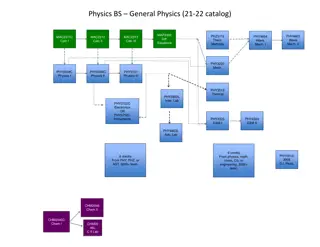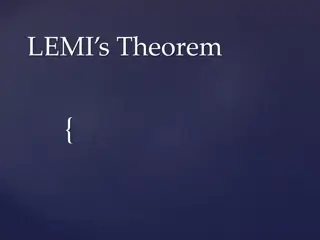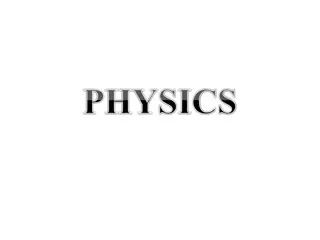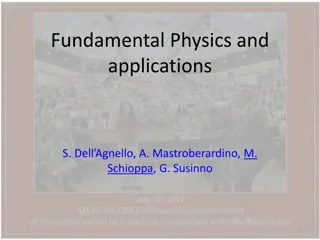Exploring Fundamental Forces in Nature: A Physics Perspective
Physics, the study of nature and its laws, explores fundamental forces governing the natural world. Gravitational force, electromagnetic force, strong nuclear force, and weak nuclear force play crucial roles in interactions at atomic and cosmic levels. Understanding these forces is essential for comprehending the dynamics of the physical world.
Download Presentation

Please find below an Image/Link to download the presentation.
The content on the website is provided AS IS for your information and personal use only. It may not be sold, licensed, or shared on other websites without obtaining consent from the author. Download presentation by click this link. If you encounter any issues during the download, it is possible that the publisher has removed the file from their server.
E N D
Presentation Transcript
PHYSICAL WORLD CLASS XI PHYSICS
INTRODUCTION Physics is the study of nature and its laws Physicists try to discover the rules that are operating in nature, on the basis of observations, experimentation and analysis Physics deals with certain basic rules/laws governing the natural world
FUNDAMENTAL FORCES IN NATURE Gravitational Force-The gravitational force is the force of mutual attraction between any two objects by virtue of their masses It is a universal force It is always attractive in nature It is independent of the medium between two masses
FUNDAMENTAL FORCES IN NATURE Electromagnetic Force-Electromagnetic force is the force between charged particles When charges are at rest, the force is given by Coulomb s law The force is attractive for unlike charges and repulsive for like charges Charges in motion produce magnetic effects Electric and magnetic effects are, in general, inseparable . hence the name electromagnetic force
FUNDAMENTAL FORCES IN NATURE Strong Nuclear Force- The strong nuclear force binds protons and neutrons in a nucleus The strong nuclear force is the strongest of all fundamental forces It is charge-independent and acts equally between a proton and a proton, a neutron and a neutron, and a proton and a neutron Its range is, however, extremely small , of about nuclear dimensions (1 fm)
FUNDAMENTAL FORCES IN NATURE Weak Nuclear Force- The weak nuclear force appears only in certain nuclear processes such as the -decay of a nucleus The weak nuclear force is not as weak as the gravitational force, but much weaker than the strong nuclear and electromagnetic forces The range of weak nuclear force is exceedingly small























